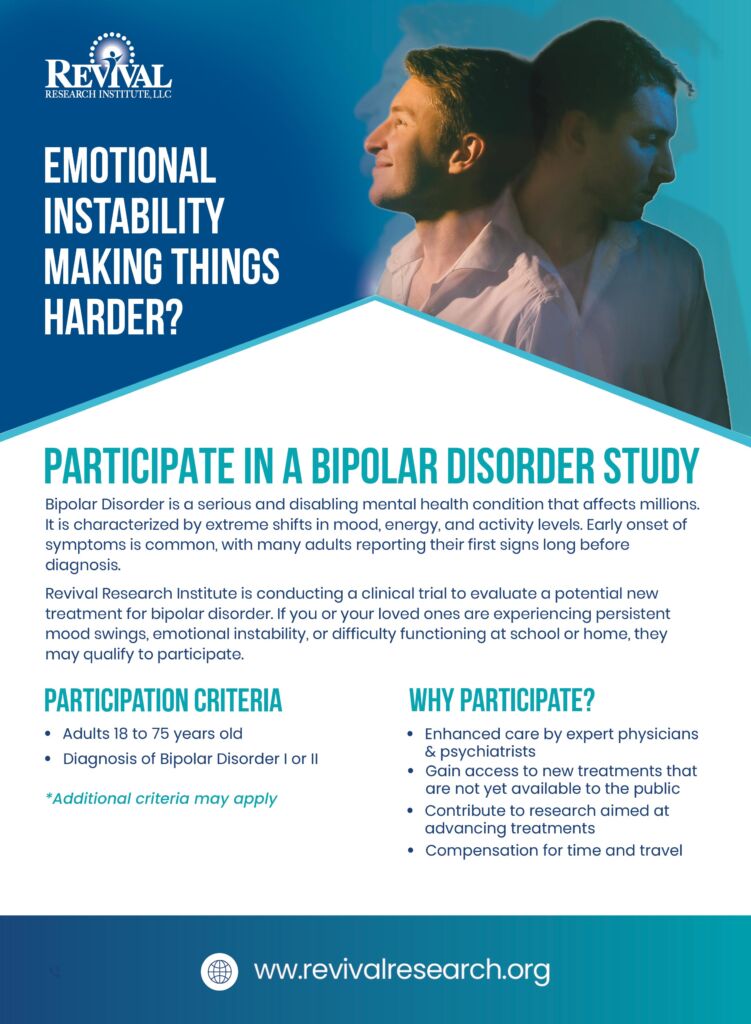Struggling with Bipolar Disorder? Clinical Trials May Help
You Are Not Alone, Clinical Trials May Help
Bipolar disorder, also known as manic depressive disorder, is a chronic mental health condition characterized by extreme shifts in mood, energy, and activity levels. These changes often interfere with daily functioning, relationships, and overall quality of life. Approximately 4.4% of U.S. adults experience bipolar disorder in their lifetime, making it one of the most common mood disorders.
Despite available therapies, many individuals continue to struggle with symptoms or experience relapses, highlighting the need for more effective and accessible bipolar disorder treatment options.
To help address this need, Revival Research Institute is conducting bipolar disorder clinical trials to explore investigational treatments for individuals living with this condition.
Are You Eligible to Participate?
To qualify for the Depression Clinical Trials, participants must:
- Adults 18 to 75 years old
- Diagnosis of Bipolar Disorder I or II
*Additional criteria may apply.
Participation is free of cost, and no insurance is required.

About Bipolar Disorder Clinical Trials
Living with bipolar disorder can be unpredictable. Periods of depression may include sadness, fatigue, and hopelessness, while manic or hypomanic episodes may bring high energy, irritability, or risky behavior. These shifts can make maintaining work, school, and relationships especially challenging.
Our bipolar disorder research studies in Texas are designed to evaluate investigational treatments that may help reduce the risk of relapse, stabilize mood, and improve overall quality of life. Participants will undergo a screening process to determine eligibility. Those who qualify will be randomly assigned to receive either investigational treatment or a placebo, in addition to standard care.
*All study-related care, including lab work and psychiatric assessments, is provided at no cost.
Get Started
What to Expect?
If you are living with bipolar disorder and qualify, you may take part in a paid clinical trial that explores potential treatment options. After completing a pre-screening call with a member of our research team to review your eligibility, you will receive detailed information about the study through an informed consent process that explains potential risks and benefits. If you agree to participate, a screening visit will follow, which includes a review of your medical history, physical exams, and lab tests. Once eligibility is confirmed, you will be enrolled in the trial and randomly assigned to receive either investigational treatment or a placebo in addition to your regular care.
Throughout the study, our team will provide continuous support, follow-up assessments, and monitoring to ensure your safety and comfort. By participating, you not only access potential new bipolar disorder treatment options but also contribute to advancing bipolar disorder research, helping shape future care for others.
Age
18 to 75 years or older
Condition
Bipolar Disorder
Location
Texas
Bipolar Disorder: A Complex Mental Health Condition

Bipolar disorder, also known as manic depressive disorder, is a chronic mental health condition marked by extreme mood shifts that range from episodes of depression to periods of mania or hypomania. Additionally, unmanaged bipolar disorder increases the risk of substance abuse, anxiety disorders, financial or legal difficulties due to impulsive actions, and suicidal ideation. Early diagnosis by experts, consistent care, and access to effective bipolar disorder treatment options are crucial to managing symptoms and reducing the risk of severe complications.
Common symptoms include
- Extreme mood swings (depression and mania/hypomania)
- Decreased need for sleep during manic episodes
- Fatigue or loss of energy during depressive episodes
- Impulsive or risky behaviors
- Difficulty concentrating or making decisions
Without timely treatment, complications may arise, including substance use, anxiety disorders, or suicidal ideation.
Possible Triggers for Manic Depressive Disorder
- Genetic predisposition or family history
- Chronic stress or trauma
- Hormonal changes
- Coexisting medical conditions
- Substance use
Frequently Asked Questions (FAQs)
Got questions about bipolar disorder clinical trials? You’re not alone.
Your Guide to Bipolar Disorder
We have compiled answers to some of the most common questions about the condition, what it is, how it’s diagnosed, available treatments, and what daily life with bipolar disorder can look like. Still can’t find what you’re looking for? Our team is here to help. Call us on (248) 721-9539, and we’ll be happy to assist you.
What is bipolar disorder?
Bipolar disorder, previously known as manic depressive disorder, is a mental health condition marked by alternating episodes of depression and mania/hypomania. It affects emotions, energy levels, and daily functioning.
How are bipolar disorder clinical trials conducted near me?
Participants undergo a structured process that may include screening, randomization, investigational treatment, and follow-up assessments. All study-related procedures are free of charge.
Where are these bipolar research studies (Location) available?
Our clinical trials are conducted at multiple sites across the United States, including Texas.
Who can participate in bipolar disorder clinical trials?
Eligibility criteria vary depending on the specific study, but generally include individuals diagnosed with bipolar disorder, either type I or type II. Participants may need to meet age, health, and medication requirements as determined by the study protocol.


